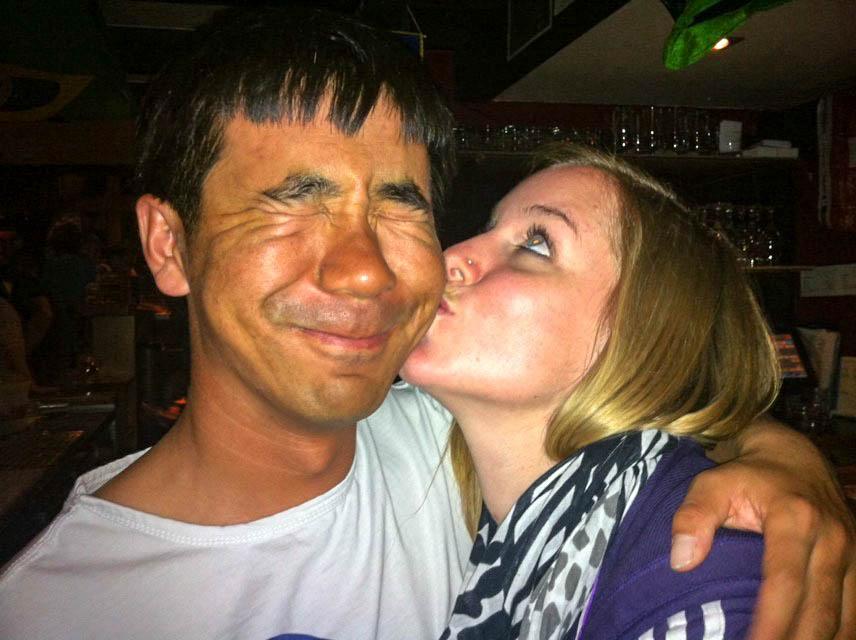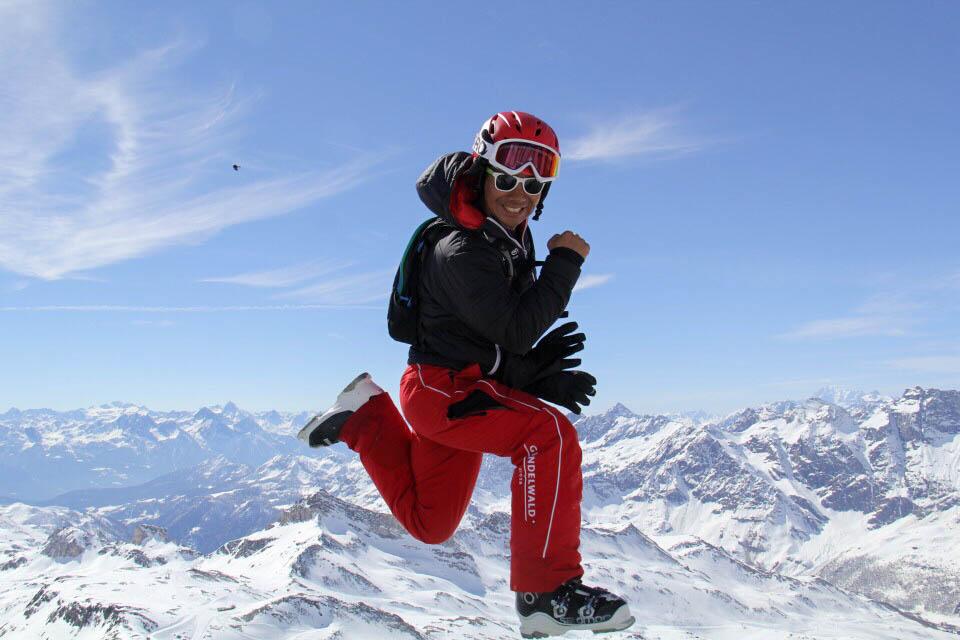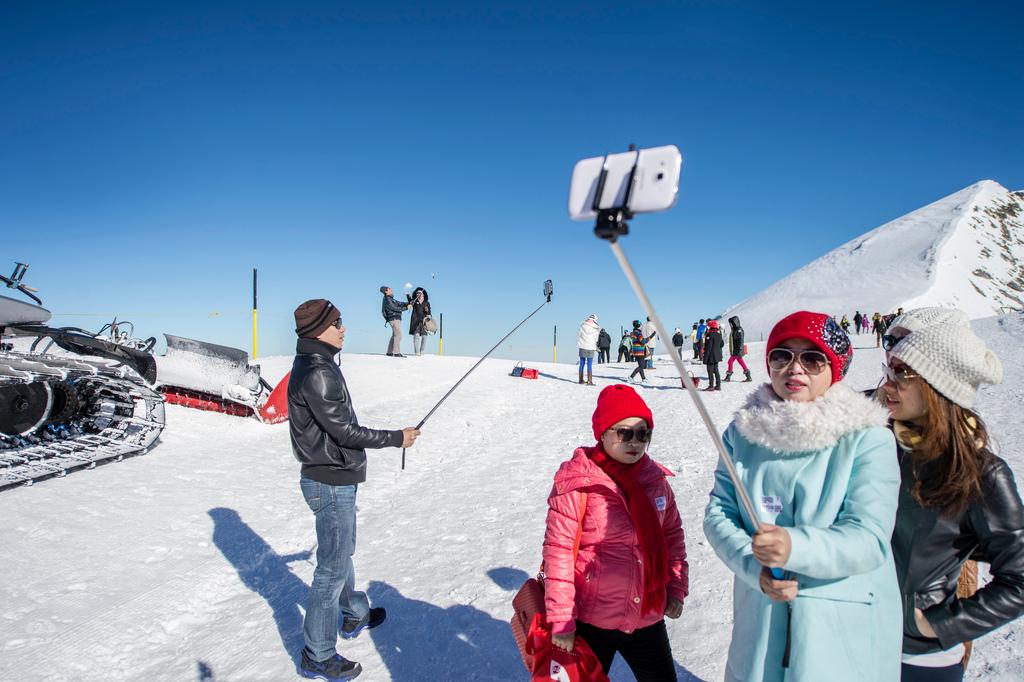
Mixed memories of a Chinese ski instructor in Switzerland

The star of a television documentary about Chinese ski instructors in Switzerland talks candidly to swissinfo.ch about culture shock, sex, racism – and warm beer.
Zhongxing Xu, known as Johnson in Switzerland, became a household name in 2013 as one of eight Chinese ski instructors who were followed by Swiss televisionExternal link giving lessons to Chinese tourists. He spent two years in the resort of Grindelwald but has now returned to China.
During his first two months in Switzerland, Xu was bombarded with media interviews. More than a million Swiss watched the documentary, making him the country’s most famous ski instructor during the winter season of 2013-2014.
“People came and took photos with me one after another. When I was on the street or train – or even on the piste – I found myself surrounded by fans. ‘Hey Johnson, I saw you on TV!’ – I heard that the whole time,” he says.
Swiss Tourism project
In December 2013, Swiss Tourism invited eight Chinese ski instructors to Switzerland. The aim was to familiarise the Chinese public with skiing and to link the image of skiing with Switzerland.
There is growing interest in China for skiing, but many people don’t know much about it.
Johnson ended up in Grindelwald. The other seven Chinese were sent to Davos, Engelberg, Gstaad, St Moritz, Verbier, Villars and Zermatt. The resorts were selected because they have a number of Chinese visitors.
Three of the instructors are still in Switzerland, one of whom has married a Swiss woman. Five have returned to China, where they work in jobs connected to skiing.
“It felt so good. I almost felt that I was a part-time ski instructor and a full-time TV star.”
Real life
Xu says he has never really talked about his real life in Switzerland. Although he was asked about this many times, he could only give his opinions on certain topics. Now he tells swissinfo.ch that once the honeymoon period, which he describes as “like a dream” ended, reality kicked it.
“The culture shock that comes from a different cultural environment is what affects me the most emotionally. Being a foreigner and witnessing sexual openness are the two issues that I was most uncomfortable with,” he says.
Xu said these feelings reached their peak once he became famous.
“When I was walking down the street, some people would glance at me indifferently or even disdainfully because they could tell from a long distance I was Asian. And all of a sudden, an image from TV or a newspaper popped into their heads and their faces became friendly and they said hi. By the time we said goodbye to each other, they would warmly say ‘ciao’,” he remembers.
“I find the sharp contrast rather unpleasant. You could smell the discrimination during the first few moments when people assumed a completely different attitude. When you live in a foreign country, people’s apathy is a nightmare, especially that racist look. It really upsets you, whether it comes from a restaurant keeper or a shop assistant.”
Sexual openness
Xu admitted he was also shocked by the sexual openness in Switzerland.
“Swiss people are really open – especially among ski instructors, which is utterly jaw-dropping. Talking about it now, it doesn’t sound that astounding, but when you see things happening in front of you…”
swissinfo.ch presses for details. “Well I once saw one of my female colleagues kissing a stranger at a bar as though she were possessed. And I saw another colleague kiss three different men in one single night at a bar. I was utterly shocked,” he says.
“Under such circumstances, you start to ask yourself philosophical questions such as “Who am I? Where am I from? Where will I go?”
Language is also a barrier, according to Xu. “If you don’t speak the other person’s mother tongue, you can never explore their inner world and you will never truly be one of them,” he believes.
“Different habits, ideologies, ways of understanding, cultures and other factors have a strong psychological impact on you. One minute you’re as happy as a child; the next you find yourself deeply frustrated.”

More
A Chinese ski instructor called Johnson
Cultural differences
By means of explanation, Xu relates two anecdotes from his time in Switzerland.
“When my colleagues used to ask me what I wanted at our school’s snack bar, I always said a glass of hot water. At first they would reply ‘only hot water?’ in surprise, and each time I would say ‘yes’. Later, when they got to know me better, they would bring me a glass of hot water. But they would tell other people privately that I drank only hot water.”
And then there’s the issue of warm beer. “I’m often asked why I always drink room-temperature beer. I reply that it’s not a big deal. We Chinese drink both iced and room-temperature beer. Sometimes we drink room-temperature beer so we don’t get cold. But some of my friends spread the word that ‘Chinese people drink room-temperature beer’ – as if such a discovery is so great that the whole town needs to know,” he says.
“It really baffles me why drinking hot water or room-temperature beer is news.”

More
Tourism today
On the other hand, Xu is bewildered by some Swiss habits such as when people blow their noses while eating at the dining table, wipe their plates with bread or lick their sauce-covered fingers. He said such behaviour was forbidden in China – even at home.
Reverse culture shock
Xu confesses that he did think of staying in Switzerland, but he eventually followed his heart and decided to return home.
Loneliness, the food and a lack of a sense of belonging are the three main reasons for his decision. In the long run, the duty to support his parents was also a factor.
Since arriving back in China, Xu says he has experienced reverse culture shock – challenges faced by people returning home.
For example, there are the rules of the road. “Observing traffic regulations is instinctive for Swiss. When pedestrians cross the road, drivers stop for them.”
In Switzerland Xu also learnt to say no. “But it would be inappropriate to say no to close friends in China, because Chinese society values sensitivity and politeness above everything.”
And finally there’s the Swiss custom of smiling at strangers to show friendliness. “If I did that in China, people might think I’ve got a mental problem.”
But ultimately, when Xu looks back at his Swiss adventure, he is full of positive emotions.
“I have with my own eyes enjoyed the exquisite beauty of the country. To me, Switzerland is paradise! The time I spent in Switzerland is the most cherished memory in my life and an unparalleled experience,” he says.
“When I think of Switzerland, four words pop into my head: been there, loved there.”
(Translated from Chinese by Yi Dong)

In compliance with the JTI standards
More: SWI swissinfo.ch certified by the Journalism Trust Initiative



























You can find an overview of ongoing debates with our journalists here . Please join us!
If you want to start a conversation about a topic raised in this article or want to report factual errors, email us at english@swissinfo.ch.